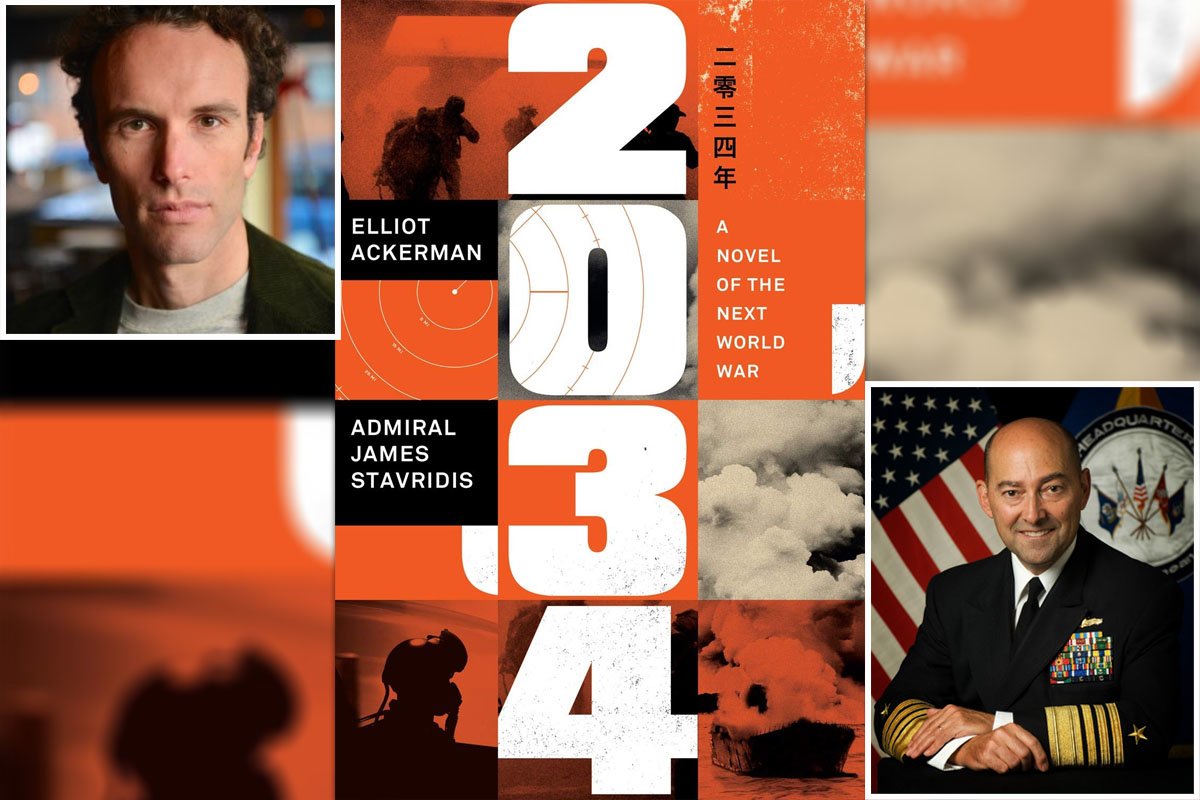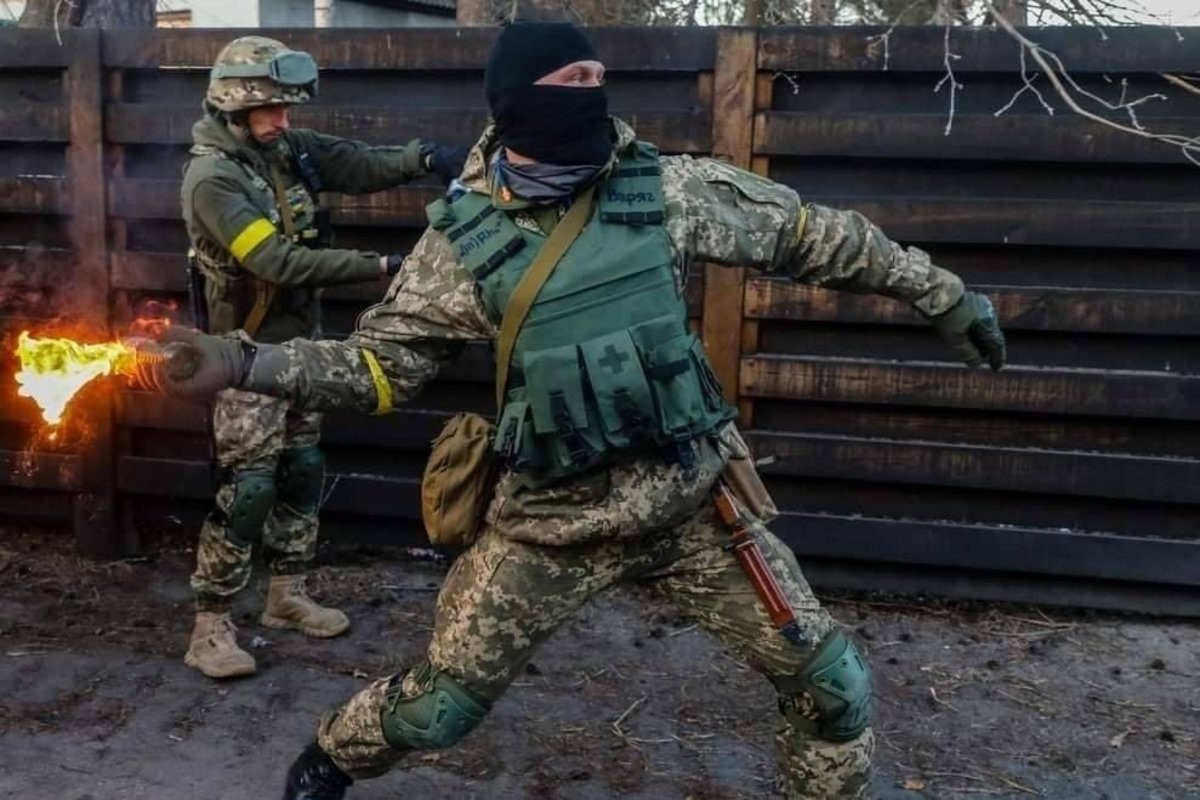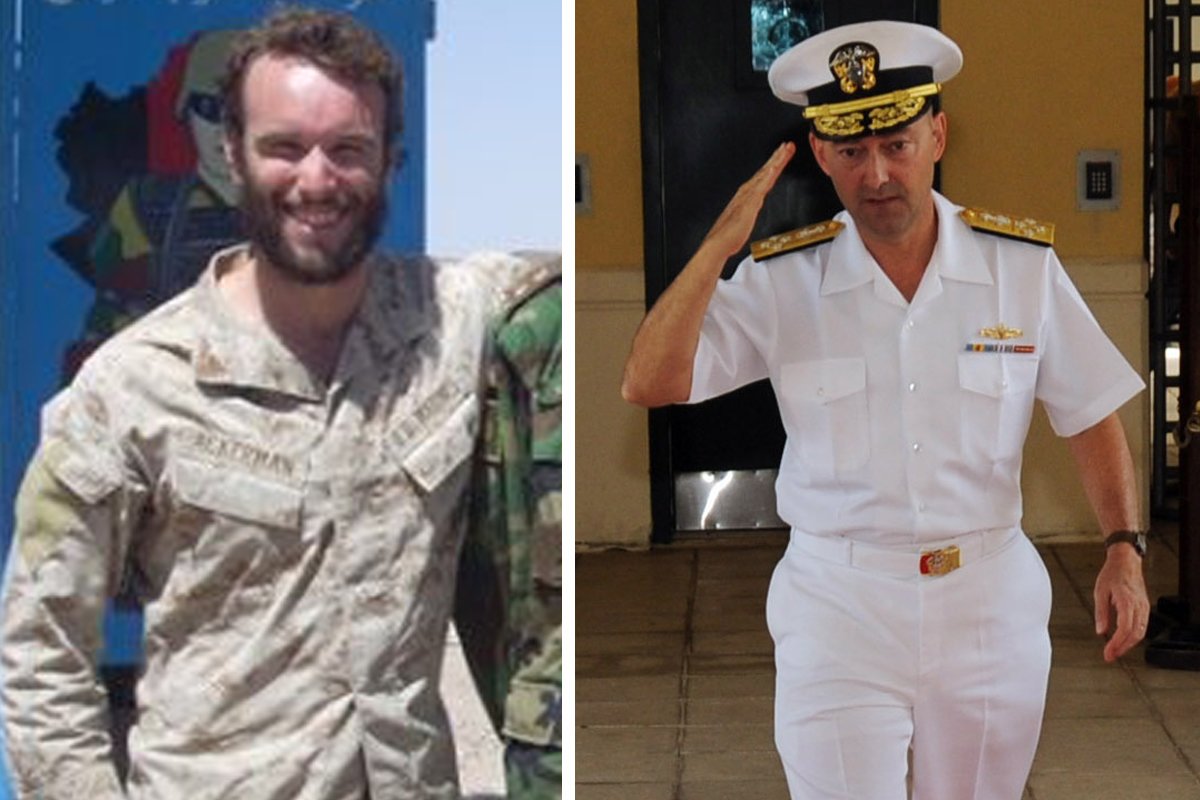‘2034’ Authors Talk World War III, Nuclear Conflict, and America’s Future

Author Elliot Ackerman, left, is a Marine Corps veteran who served five tours of duty in Iraq and Afghanistan, where he received the Silver Star, the Bronze Star for Valor, and the Purple Heart; Adm. James Stavridis, right, retired from the US Navy after a 30-year career. Together they are the authors of 2034. Composite by Coffee or Die Magazine.
When he served as supreme allied commander of NATO, Adm. James Stavridis spent a lot of time worrying about the potential for nuclear conflict between superpowers and the grim realities of how a third world war might shake out. Against the backdrop of rising political tensions between the US and China, the retired admiral and bestselling author of several nonfiction works pitched his editor — Scott Moyers at Penguin Press — on the idea of writing a speculative novel about World War III.
Moyers encouraged Stavridis to partner with Elliot Ackerman to tackle the ambitious project. Ackerman is a former Marine Raider and decorated combat leader turned acclaimed novelist whom Moyers also represents, and Ackerman and Stavridis had known each other since meeting in 2013 at an event for alumni of the Fletcher School of Law and Diplomacy at Tufts University. The marriage of Stavridis’ vast strategic knowledge and Ackerman’s skill and experience as a fiction writer ultimately produced 2034: A Novel of the Next World War.
Published in March 2021, the bestselling novel is even more relevant and disconcerting in the wake of Russia’s invasion of Ukraine. That conflict has forced the world to confront the possibility of Vladimir Putin using nuclear weapons and setting off a chain of events that could lead to another world war with nightmarish implications for humanity.

Coffee or Die Magazine spoke with 2034 authors Stavridis and Ackerman about the book’s themes and what the authors hope readers will take away from their cautionary novel.
COD: Reading this book, I felt the work was, in many ways, a piece of didactic art. Is this novel a metaphorical shot across the bow for Americans? Is this a wake-up call?
JS: As I watched the US and China have ongoing difficulties, I think what really got me going was looking at Cold War literature from the US-versus-Soviet-Union period — cautionary tales like Dr. Strangelove, Fail-Safe, The Bedford Incident. I wanted to write a cautionary novel about how bad war with China could ultimately end up being. The design here is to show a general audience what a war with China might look like. The story of mankind’s journey in the conflict zone is that so often wars come upon you without any deliberate planning. Nations are replete with events where they have stumbled into wars — often horrific, huge wars. The human capacity to get ourselves into wars is pretty high, and the central theme of the book is that it is a cautionary tale that ought to help us curb our enthusiasm for conflict.
EA: A character-based novel is a great way to interrogate war because you’re looking at people involved in the conflict and how they are not only decision-makers within that conflict but also wrapped up in it. We wanted to draw real, sympathetic characters. I think the job of a novelist is not to be didactic toward your characters and say who’s good or who’s bad, but to let your characters make the case to the reader as if they’re stepping out on the stage and making their case before God. If there’s any villain in this book, the villain is war itself.
COD: I was fascinated by the recurring theme of how a small group of government and military leaders and bureaucrats have so much power to influence outcomes in the geopolitical realm. How accurate is that depiction?
JS: It’s highly accurate. I think most Americans believe our defense policy and strategy and the big international decisions we make are part of a carefully orchestrated strategic effort crafted by brilliant people. But the big decisions and events often turn on an annoying briefing, a badly delivered remark, or a personal antagonism in the Situation Room. There are so many of these tiny little hinges, and big doors swing on small hinges. It’s the small, intimate moments that are difficult to predict, and that is part of the challenge that we laid out in the book. There are moments in the book where you just want to reach into the novel and say, “Stop! Call that strike back!” You want to say it to the Chinese and the Americans because it’s in neither nation’s interests. Individuals in the book are those small hinges that are making this big door swing.
COD: This novel deals with nuclear war between superpowers. What do you want readers to take away from that part of your tale?
JS: The work here so often is about patterns of escalation. Somebody does something bad, and someone else responds but feels like, “I’m gonna go just a little bit further.” And the next person then lashes out a little bit worse. The ladder of escalation is repeated throughout military and world history, and the nightmare end of that ladder is a strategic nuclear exchange, which is potentially world-destroying. I’ve often laid awake at night as a Supreme Allied Commander concerned about tactical nuclear weapons. We have them, and our opponents have them. And while you can start in what looks like a relatively small space — a kiloton here, a kiloton there — pretty soon you’re talking about the end of the world. Escalation is the worry, and we move toward nuclear level exchanges in this novel because I think that’s realistic.

COD: One of the novel’s aims seems to be to illuminate the pitfalls of American hubris. How can the US avoid the same type of decline or collapse that so many empires have seen throughout history?
EA: When nations behave a certain way over an extended period, there are consequences to that. You see in the books that the Chinese and the Americans start this war, but they aren’t the ones who finish it. And the ones who finish the war are the ones who become the beneficiaries of it. The United States has done that in the past. The question is, would we be wise enough to do that in the future? And are we even on a trajectory to do that in the future?
JS: I’m not a declinist about the United States, and I’m not a triumphalist. I don’t think the United States ought to be the world police and continually engage in the kind of tragic misadventures that have led us into Iraq and Afghanistan. On the other hand, we have many attributes that will allow us to continue to be incredibly important. We are bordered on the east and west by vast oceans with benign neighbors to the north and south. We have abundant land and fresh water. We’re hydrocarbon rich. We have a dynamic, relatively young population. People still want to immigrate here. We have a lot going for us. The cause for concern is the kind of divisions that are tearing us apart — the gridlock and misinformation on both the political right and left. So we have challenges, but we have great potential to continue to be in a significant position globally. The question 2034 poses is “Will we find a way to maintain that position, leveraging all these advantages?” It is the primal question of the 21st century. It’s not about the rise of China. It’s about the future of the United States.
COD: 2034 seems to give a nod to the idea that America is more than a nation — that it’s really a particular set of values and beliefs that hopefully will always endure, even if this grand experiment of ours fails. What do you think of that idea?
EA: The history of America is us striving to create a more perfect union — to hit that ideal. At times we’ve done it, and at times we haven’t. But the essence of America is that enduring ideal, and it’s worth investing in and has brought much more good than harm to this world.
JS: We know what the ideals are: democracy, liberty, freedom of speech, freedom of the press, freedom of education, gender equality, racial equality. They’re the right ideas, but we execute them imperfectly. But I’m still going to bet on our striving to create a more perfect union. We’re going to continue to make progress — unevenly — but we’ll continue to progress.
Read Next: Veteran Authors Speculate on the Next World War in Novel ‘2034’

Ethan E. Rocke is a contributor and former senior editor for Coffee or Die Magazine, a New York Times bestselling author, and award-winning photographer and filmmaker. He is a veteran of the US Army and Marine Corps. His work has been published in Maxim Magazine, American Legion Magazine, and many others. He is co-author of The Last Punisher: A SEAL Team THREE Sniper’s True Account of the Battle of Ramadi.
BRCC and Bad Moon Print Press team up for an exclusive, limited-edition T-shirt design!
BRCC partners with Team Room Design for an exclusive T-shirt release!
Thirty Seconds Out has partnered with BRCC for an exclusive shirt design invoking the God of Winter.
Lucas O'Hara of Grizzly Forge has teamed up with BRCC for a badass, exclusive Shirt Club T-shirt design featuring his most popular knife and tiomahawk.
Coffee or Die sits down with one of the graphic designers behind Black Rifle Coffee's signature look and vibe.
Biden will award the Medal of Honor to a Vietnam War Army helicopter pilot who risked his life to save a reconnaissance team from almost certain death.
Ever wonder how much Jack Mandaville would f*ck sh*t up if he went back in time? The American Revolution didn't even see him coming.
A nearly 200-year-old West Point time capsule that at first appeared to yield little more than dust contains hidden treasure, the US Military Academy said.












